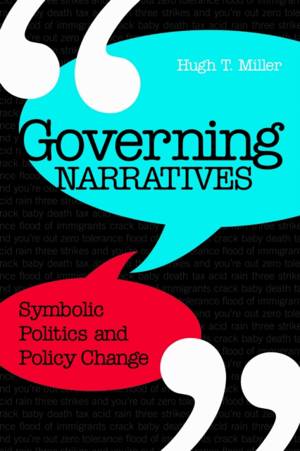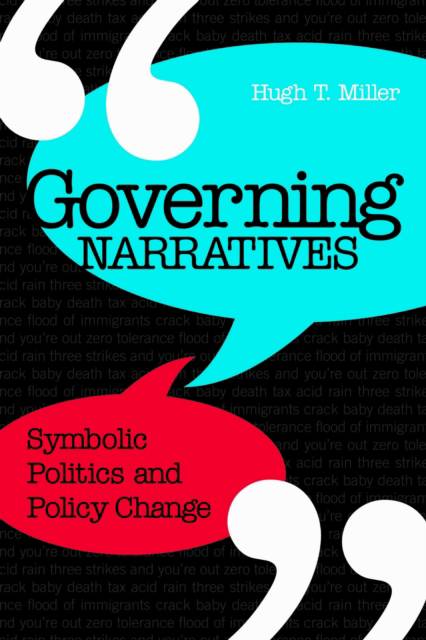
- Afhalen na 1 uur in een winkel met voorraad
- Gratis thuislevering in België vanaf € 30
- Ruim aanbod met 7 miljoen producten
- Afhalen na 1 uur in een winkel met voorraad
- Gratis thuislevering in België vanaf € 30
- Ruim aanbod met 7 miljoen producten
Zoeken
Omschrijving
By highlighting the degree to which meaning making in public policy is more a cultural struggle than a rational and analytical project, Governing Narratives brings public administration back into a political context. In Governing Narratives, Hugh T. Miller takes a narrative approach in conceptualizing the politics of public policy. In this approach, signs and ideographs--that is, constellations of images, feelings, values, and conceptualization--are woven into policy narratives through the use of story lines. For example, the ideograph "acid rain" is part of an environmental narrative that links dead trees to industrial air pollution. The struggle for meaning capture is a political struggle, most in evidence during times of change or when status quo practices are questioned.
Public policy is often considered to be the end result of empirical studies, quantitative analyses, and objective evaluation. But the empirical norms of science and rationality that have informed public policy research have also hidden from view those vexing aspects of public policy discourse outside of methodological rigor.
Phrases such as "three strikes and you're out" or "flood of immigrants" or "don't ask, don't tell" or "crack baby" or "the death tax" have come to play crucial roles in public policy, not because of the reality they are purported to reflect, but because the meanings, emotions, and imagery connoted by these symbolizations resonate in our culture.
Social practices, the very material of social order and cultural stability, are inextricably linked to the policy discourse that accompanies social change. Eventually a winning narrative dominates and becomes institutionalized into practice and implemented via public administration. Policy is symbiotically associated with these winning narratives. Practices might change again, but this inevitably entails renewed political contestation. The competition among symbolizations does not imply that the best narrative wins, only that a narrative has won for the time being. However, unsettling the established narrative is a difficult political task, particularly when the narrative has evolved into habitual institutionalized practice.
Governing Narratives convincingly links public policy to the discourse and rhetoric of deliberative politics.
Public policy is often considered to be the end result of empirical studies, quantitative analyses, and objective evaluation. But the empirical norms of science and rationality that have informed public policy research have also hidden from view those vexing aspects of public policy discourse outside of methodological rigor.
Phrases such as "three strikes and you're out" or "flood of immigrants" or "don't ask, don't tell" or "crack baby" or "the death tax" have come to play crucial roles in public policy, not because of the reality they are purported to reflect, but because the meanings, emotions, and imagery connoted by these symbolizations resonate in our culture.
Social practices, the very material of social order and cultural stability, are inextricably linked to the policy discourse that accompanies social change. Eventually a winning narrative dominates and becomes institutionalized into practice and implemented via public administration. Policy is symbiotically associated with these winning narratives. Practices might change again, but this inevitably entails renewed political contestation. The competition among symbolizations does not imply that the best narrative wins, only that a narrative has won for the time being. However, unsettling the established narrative is a difficult political task, particularly when the narrative has evolved into habitual institutionalized practice.
Governing Narratives convincingly links public policy to the discourse and rhetoric of deliberative politics.
Specificaties
Betrokkenen
- Auteur(s):
- Uitgeverij:
Inhoud
- Aantal bladzijden:
- 160
- Taal:
- Engels
- Reeks:
Eigenschappen
- Productcode (EAN):
- 9780817317737
- Verschijningsdatum:
- 14/09/2012
- Uitvoering:
- Hardcover
- Formaat:
- Genaaid
- Afmetingen:
- 155 mm x 229 mm
- Gewicht:
- 362 g

Alleen bij Standaard Boekhandel
+ 75 punten op je klantenkaart van Standaard Boekhandel
Beoordelingen
We publiceren alleen reviews die voldoen aan de voorwaarden voor reviews. Bekijk onze voorwaarden voor reviews.







